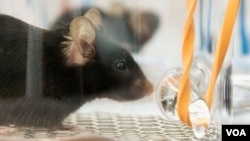Malaria infection makes mice smell a bit better to mosquitoes, raising the odds that they’ll be bitten and spread the disease. That’s according to a new study in the Proceedings of the National Academy of Sciences.
The research could point the way to a Breathalyzer-style diagnostic test for malaria infection.
And it’s the latest example of how parasites manipulate the creatures they infect for their own nefarious aims.
Penn State University biologist Mark Mescher has seen it before. But not in people, in squash.
When squash plants are infected with cucumber mosaic virus, they produce chemicals that attract aphids. The aphids pick up the virus when they come to the plant for the advertised meal.
The virus even goes an extra step: It makes the plant less nutritious to the insects. After a few bites, Mescher said, the aphids “don’t like the plant very much. So, rather than staying there for the long term they move on and go to the next plant,” spreading the virus with them.
Mescher wondered if something similar was happening with malaria. A couple of studies in people and birds have suggested mosquitoes prefer the malaria-infected over the uninfected. But the studies did not explain why.
Eau de mouse
Mescher and his colleagues found that they could get the same tantalizing effect in malaria-infected mice. Given a choice, about 60 percent of the mosquitoes in their experiment were drawn to an infected mouse, while around 40 percent went for the uninfected.
The mice didn't even need to be there. The scientists collected the volatile chemicals wafting off infected and uninfected mice and let mosquitoes smell it. Eau de infected mouse had the about same attractive effect as an actual infected mouse.
The researcher found a handful of chemicals in the mouse-odor cocktail that were at higher levels in infected animals than healthy ones. A dab of those chemicals would make even a healthy mouse more appealing to mosquitoes.
“The malaria parasite is enhancing the odor cues the mosquito is already using to find their host,” Mescher said, which helps the parasite hitch a ride to the next victim.
Malaria breathalyzer
Knowing what the mosquitoes are smelling could help identify people who are carrying the malaria parasite but don’t know it.
“It would be nice to have biomarkers that you could use to identify infected individuals that are not actually sick with malaria, or have asymptomatic infections, but are still capable of transmitting the disease,” Mescher said.
It’s a long way off, he added, but, “If you can identify a chemical signature of infection, then you could imagine something like a Breathalyzer, or something along those lines, that would be quick and easy to get the sample and analyze right there in the field.”
“The question is whether it will go beyond solving the mouse malaria problem and get on to the people malaria problem,” joked Peter Hotez, dean of tropical medicine at Baylor College of Medicine.
Parasite manipulation
Hotez noted that malaria is not the only parasite that tweaks the animal it infects in order to improve the odds for its offspring.
A germ called Toxoplasma gondii needs to infect a cat as part of its life cycle. Mice infected with Toxoplasma conveniently lose their fear of cats.
“The way [the germ] propagates itself is by getting eaten and infecting the new animal,” Hotez explained. “It’s a very innovative story that’s emerging in the biology of the host-parasite relationship.”
Innovative ... and a bit creepy.




